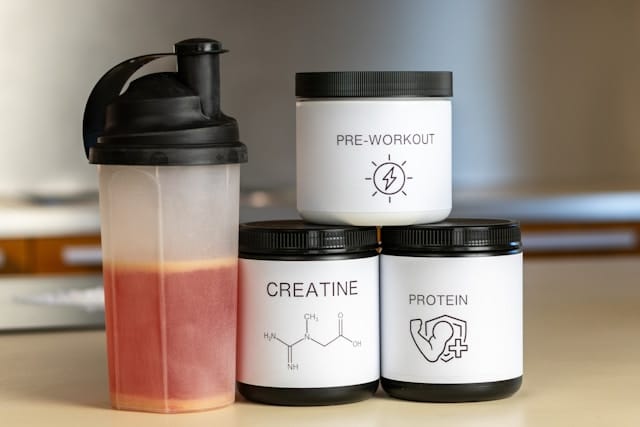Are you on a ketogenic diet and wondering whether creatine can be a part of your fitness routine? You’re not alone. Many people on keto, whether for weight loss, improved mental clarity, or enhanced energy, are curious about how supplements like creatine fit into their low-carb, high-fat lifestyle. In this comprehensive guide, we will explore everything you need to know about creatine on keto diet, including how it works, its benefits, and how to use it properly.
What is Creatine?
Creatine is a naturally occurring compound found in muscle cells. It’s made up of three amino acids: arginine, glycine, and methionine. Creatine is stored in your muscles and used to generate quick energy during high-intensity activities, like weightlifting, sprinting, or any short burst of strenuous activity.
Creatine and ATP
The body uses creatine to produce adenosine triphosphate (ATP), the primary energy currency of the body. When your muscles need quick energy, such as during heavy lifting or intense workouts, creatine helps regenerate ATP, allowing you to maintain peak performance for a longer period.
Natural Sources of Creatine
Creatine can be found in certain foods, especially in animal products like red meat and fish. However, the amount found in food is relatively small, which is why many people take creatine supplements, especially those involved in high-intensity sports and fitness.
What is the Ketogenic Diet?
The ketogenic (or keto) diet is a low-carbohydrate, high-fat eating plan designed to put the body into a state of ketosis. When you’re in ketosis, your body switches from burning carbohydrates (glucose) for energy to burning fat. The liver breaks down fats into molecules called ketones, which are then used as fuel for the body, particularly the brain.
Key Features of the Keto Diet:
- Low-Carb: Usually under 50 grams of carbohydrates per day.
- High-Fat: Fat makes up around 70-80% of your daily calorie intake.
- Moderate-Protein: Protein is moderate, usually around 20-25% of your intake.
How Does Creatine Work?
As mentioned earlier, creatine’s main job is to help produce more ATP, which gives your muscles the energy needed to perform at their best. Creatine supplements can help increase the creatine stores in your muscles, leading to improved muscle strength, endurance, and recovery.
Benefits of Creatine:
- Increased Strength: Creatine is proven to help increase muscle strength, making it a popular supplement for those looking to build muscle.
- Improved Endurance: It can also help improve endurance during high-intensity workouts.
- Faster Recovery: Creatine can speed up muscle recovery after workouts, helping you get back to your routine quicker.
- Enhanced Brain Function: Emerging research suggests that creatine may also support cognitive function by improving brain energy levels.
Why Combine Creatine with Keto?
You may wonder, why would I want to combine creatine with keto? There are several reasons why creatine on ketogenic diet can be an excellent pairing, especially if you’re looking to improve your workout performance while following the low-carb lifestyle.
Benefits of Combining Creatine with Keto:
- Increased Energy During Workouts: One of the challenges of a keto diet is reduced energy during intense workouts, especially in the initial stages of keto adaptation. Creatine can help by providing your muscles with more ATP, giving you a boost when you need it most.
- Improved Muscle Mass and Strength: If you’re on a ketogenic diet for fat loss but don’t want to lose muscle mass, creatine can help. It supports muscle growth and retention, which can be especially important when you’re cutting carbs.
- Enhanced Recovery: Keto dieters may experience longer recovery times due to glycogen depletion. Creatine can help speed up recovery, enabling you to work out more frequently without overtraining.
- Prevents Muscle Cramps and Fatigue: Many people on a ketogenic diet experience muscle cramps due to low electrolyte levels. Creatine can help by increasing water retention in muscles, reducing the likelihood of cramps.
Benefits of Creatine on Keto Diet
Creatine offers a wide range of benefits that make it a great supplement to consider when on a ketogenic diet.
a. Improved Exercise Performance:
On a ketogenic diet, you may find it harder to maintain high performance during intense exercise. Creatine can help by replenishing your muscles’ ATP stores, enabling you to push harder during workouts.
b. Increased Muscle Mass:
Creatine is well-known for its muscle-building benefits. If you’re doing resistance training on a keto diet, creatine can help enhance muscle growth and prevent muscle loss, which is often a concern when following a low-carb diet.
c. Enhanced Fat Loss:
Creatine, when combined with strength training, can help accelerate fat loss by increasing your lean body mass. More muscle means a higher metabolism, which can aid in burning fat more effectively.
d. Cognitive Benefits:
Both creatine and a ketogenic diet have been shown to improve brain health. Combining the two could potentially lead to better mental clarity and focus, which is another benefit for keto followers.
How to Use Creatine on a Ketogenic Diet
If you’re considering adding creatine to your ketogenic diet, here’s a simple guide on how to use it effectively:
a. When to Take Creatine:
Creatine can be taken at any time of the day, but research suggests that taking it post-workout may offer the most benefits. This is when your muscles are primed to absorb nutrients, including creatine.
b. Loading Phase:
Some people prefer to “load” creatine by taking 20 grams a day for 5-7 days, then switching to a maintenance dose. This helps saturate your muscles quickly, but it’s not necessary. You can simply start with a daily maintenance dose.
c. Maintenance Dose:
The standard maintenance dose of creatine is around 3-5 grams per day. This is enough to maintain elevated creatine levels in your muscles.
d. With or Without Carbs:
The good news is that creatine doesn’t need carbs to work effectively, making it a perfect match for a low-carb ketogenic diet. While creatine is often taken with a sugary drink to improve absorption, this is not necessary for keto followers.
Potential Side Effects and Considerations
Creatine is one of the most studied supplements and is considered safe for most people. However, like any supplement, it’s important to be aware of potential side effects, especially when combining it with a ketogenic diet.
a. Water Retention:
One of the most common side effects of creatine is water retention. This can cause temporary weight gain, which may be discouraging for those on keto for fat loss. However, this water retention is usually in the muscles, not under the skin, and can actually improve muscle fullness and strength.
b. Digestive Issues:
Some people may experience digestive issues when starting creatine, especially during the loading phase. To avoid this, you can skip the loading phase and take a smaller daily dose instead.
c. Kidney Concerns:
There is a myth that creatine can cause kidney damage, but research shows that it is safe for healthy individuals. However, if you have pre-existing kidney conditions, it’s always best to consult with your doctor before starting any new supplement.
Choosing the Right Creatine Supplement
When it comes to choosing a creatine supplement, not all products are created equal. Here’s what to look for:
a. Creatine Monohydrate:
Creatine monohydrate is the most studied and effective form of creatine. It’s also affordable and widely available.
b. Avoid Unnecessary Additives:
Some creatine supplements contain added sugars or fillers, which are not ideal for a ketogenic diet. Look for a pure creatine monohydrate product without unnecessary ingredients.
Creatine Dosage on Keto Diet
a. Standard Dosage:
The standard dose of creatine for adults is 3-5 grams per day, whether you’re on keto or not. This amount is enough to maintain your creatine stores and experience the benefits without overloading your system.
b. Adjusting for Body Weight:
If you’re heavier or involved in intense weight training, you may want to adjust your dose. A common recommendation is to take 0.03 grams of creatine per kilogram of body weight.
Can Creatine Kick You Out of Ketosis?
One of the most common questions people ask is, Can creatine kick me out of ketosis? The answer is no. Creatine does not contain carbohydrates and does not affect insulin levels in a way that would interfere with ketosis.
However, some creatine products may contain added sugars, so always read the label carefully to ensure your creatine supplement is keto-friendly.
YOU MAY ALSO LIKE: How Much Protein on Keto Diet?
Common Myths About Creatine on Keto
a. Creatine Causes Weight Gain:
While creatine may cause temporary water retention, this is not the same as fat gain. In fact, creatine can help you build muscle and lose fat when combined with resistance training.
b. Creatine is Harmful to Your Health:
Creatine is one of the safest and most researched supplements available. When used responsibly, it poses no significant risks to healthy individuals.
c. You Don’t Need Creatine on Keto:
Some people believe that because keto provides steady energy from fats, creatine isn’t necessary. However, creatine provides a different type of energy—quick bursts for high-intensity activity—which can be incredibly beneficial on a ketogenic diet.
Should You Take Creatine with Keto?
In summary, combining creatine with keto diet can be a powerful tool for improving your workout performance, building muscle, and enhancing fat loss. Creatine is a safe and effective supplement that fits well into a ketogenic lifestyle, helping you achieve your fitness goals without disrupting ketosis.
Adding creatine to your supplement regimen could be the key to taking your fitness to the next level. Always start with a small dose, monitor how your body responds, and consult with a healthcare professional if you have any concerns.


